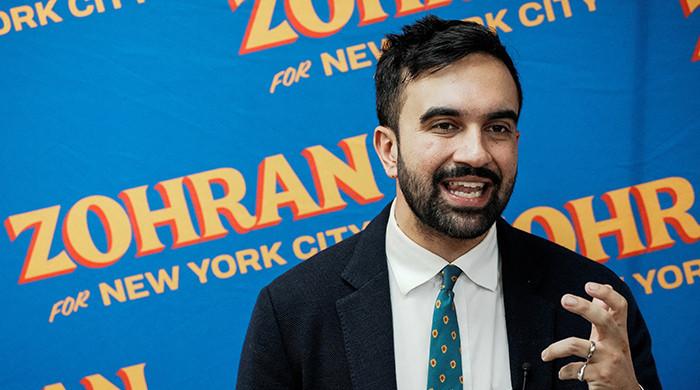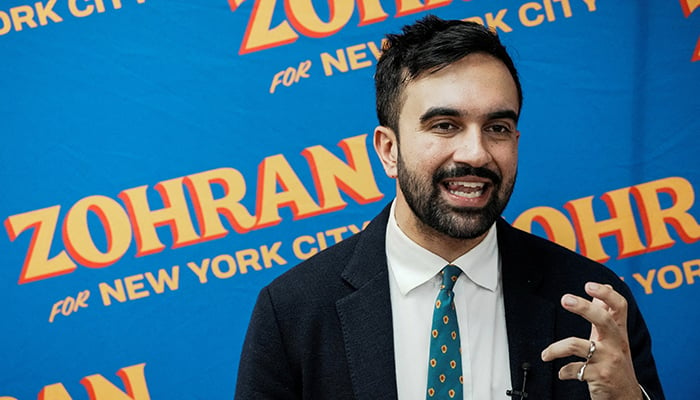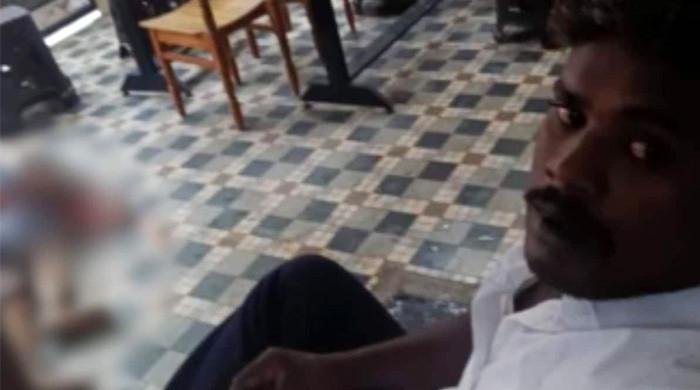Politics
Zohran Mamdani, rapper turned NYC mayoral frontrunner, embraces diverse roots


Not every candidate for New York City mayor has rapped about having the same history as a chapati, or has convinced acclaimed food critic Madhur Jaffrey to perform in a video standing in a food truck, but Zohran Mamdani has.
Born in Uganda, of Indian parents, Mamdani is a former rapper and the leading candidate in the November election. His heritage could resonate in the diverse city he hopes to lead.
Mamdani took a break from music when he first ran for office, winning a seat in the state assembly in 2020, representing Queens, the New York City borough with the largest Indian population.
However, his past life in hip-hop remains a part of his official record. In his annual financial disclosures, the New York state assemblyman lists “self-employed rapper” as among his jobs and he still earns negligible royalties from performing under the names Young Cardamom and Mr. Cardamom.
Early in his music career, Mamdani performed as part of a duo with his childhood friend Hussein Abdul Bar at a music festival in their birthplace of Uganda in 2016.

“Queen of Katwe,” directed by Mamdani’s mother, award-winning Indian filmmaker Mira Nair, had also just been released, along with a video for a song contributed by Mamdani.
The Disney movie recounts the true story of a girl from a Ugandan slum who becomes a top chess player. Lupita Nyong’o and young actors from the movie appear in the music video.
“He would go on TV for interviews, or on the radio for interviews, when his music video was going around on TV,” said Derek Debru, a co-founder of the festival known as Nyege Nyege, which translates from Luganda as “urge to dance.”
After meeting a hip-hop producer during the shooting of the movie, Mamdani recorded a few songs of his own.
Bilingual rap
One of them, about a flatbread popular in India and East Africa, includes the lyric: “I got the same history as chapati, origins of India, but born in UG. Rock brown skin, but I’m Ugandan. I can rap both in English and Luganda.”
Mamdani did not respond to a request for an interview.
Another of his projects featured renowned Indian culinary writer and actress Madhur Jaffrey.
Jaffrey, as a cool grandmother in a yellow hoodie, rapped with her middle fingers up, cursed, and danced in a street food cart alongside Mamdani, who wore an apron with no shirt underneath.

“I have to make a murder as Lady Macbeth… so what’s a few dirty words between us?” Jaffrey said about her role in the video on the talk show Good Morning Britain.
When Democratic candidate Mamdani won the mayoral primary, a friend from his years in Uganda, Magnus Thomson, initially thought that he had been elected mayor. It took him a few days to realise a general election still had to be won.
Thomson, a Dane who was the sound producer on Mamdani’s song with Jaffrey, said he was happy Mamdani did not change his democratic socialist views.
“It’d be a different story if he was doing something wildly different or something I didn’t agree with, you know,” Thomson said.
In a campaign video released in July, Mamdani is seen making hip-hop legend RZA from Wu-Tang Clan laugh by referencing Wu-Tang Financial, a sketch in which the hip-hop stars played financial consultants. Their strategy was described by this line from their hit C.R.E.A.M: “Get the money, dollar, dollar bill, y’all.”
The main point of their exchange was RZA’s home in the low-income Brooklyn neighborhood of Brownsville, which Mamdani said should be a place that people don’t want to leave.
Debru believes that Mamdani the rapper shares something with Mamdani the politician.
“We knew who he was. It was really exciting to see… a person like him from his background and also not shying away from his background,” Debru said. “I think this is what made him so special, that he sort of owned who he was.”
Politics
Tajikistan says five Chinese nationals killed in cross-border attacks from Afghanistan in past week


- China advises companies, personnel to evacuate border area.
- Embassy says Chinese citizens targeted in armed attack on Sunday.
- Another border attack on Friday killed three citizens: embassy.
Five Chinese nationals have been killed and five more injured in Tajikistan in attacks launched from neighbouring Afghanistan over the past week, Tajik authorities and China’s embassy in the Central Asian country said on Monday.
China’s embassy in Dushanbe, the capital, advised Chinese companies and personnel to urgently evacuate the border area.
It said that Chinese citizens had been targeted in an armed attack close to the Afghan border on Sunday. On Friday, it said that another border attack — which Tajik authorities said had involved drones dropping grenades — had killed three Chinese citizens.
Tajikistan, a mountainous former Soviet republic of around 11 million people with a secular government, has tense relations with the Taliban authorities in Afghanistan. It has previously warned of drug smugglers and illicit gold miners working along the remote frontier.
China, which also has a remote, mountainous border with Tajikistan, is a major investor in the country.
There was no immediate response on Monday from the authorities in Afghanistan to the Tajik statement.
But Afghanistan’s foreign ministry last week blamed an unnamed group, which it said was out to create instability, and said it would cooperate with Tajik authorities.
Tajik President Emomali Rahmon’s press service said on Monday that Rahmon had met with the heads of his security agencies to discuss how to strengthen border security.
It said that Rahmon “strongly condemned the illegal and provocative actions of Afghan citizens and ordered that effective measures be taken to resolve the problem and prevent a recurrence of such incidents.”
Tajikistan endured a brutal civil war in the 1990s after independence from Moscow, during which Rahmon initially rose to power. The country is closely aligned with Russia, which maintains a military base there.
Millions of Tajiks, a Persian-speaking nation, live across the border in Afghanistan, with Tajikistan historically having backed Afghan Tajiks opposed to the Taliban.
Politics
Indian man kills wife, takes selfie with dead body


A man in India’s south brutally killed his estranged wife at a women’s hostel and took a selfie with her dead body, according to NDTV.
The victim, identified as Sripriya, employed at a private firm in Coimbatore, Tamil Nadu, had separated from her husband, Balamurugam, who was from Tirunelveli.
Police said the suspect arrived at the hostel on Sunday afternoon, concealing a sickle in his clothes, and was seeking to meet her.
They had an argument soon after the couple met, and the feud turned into a violent attack by Balamurugan, who drew the sickle and hacked the woman to death.
Furthermore, the police said he then took a selfie with her body and shared it on his WhatsApp status, accusing her of “betrayal”.
The incident spread panic and chaos in the hostel.
Following the brutal murder, the suspect did not escape from the spot but waited until the police arrived, and he was arrested at the crime scene. The murder weapon was recovered.
The initial investigation suggested that he suspected his wife of being in a relationship with another man.
Politics
Southeast Asia storm deaths near 700 as scale of disaster revealed


- Indonesia, Malaysia and Thailand witness large scale devastation.
- At least 176 people perish in Thailand and three in Malaysia.
- Indonesia’s death toll reaches 502 with 508 more still missing.
PALEMBAYAN: Rescue teams in western Indonesia were battling on Monday to clear roads cut off by cyclone-induced landslides and floods, as improved weather revealed more of the scale of a disaster that has killed close to 700 people in Southeast Asia.
Indonesia, Malaysia and Thailand have seen large scale devastation after a rare tropical storm formed in the Malacca Strait, fuelling torrential rains and wind gusts for a week that hampered efforts to reach people stranded by mudslides and high floodwaters.
At least 176 have been killed in Thailand and three in Malaysia, while the death toll climbed to 502 in Indonesia on Monday with 508 missing, according to official figures.
Under sunshine and clear blue skies in the town of Palembayan in Indonesia’s West Sumatra, hundreds of people were clearing mud, trees and wreckage from roads as some residents tried to salvage valuable items like documents and motorcycles from their damaged homes.

Men in camouflage outfits sifted through piles of mangled poles, concrete and sheet metal roofing as pickup trucks packed with people drove around looking for missing family members and handing out water to people, some trudging through knee-deep mud.
Months of adverse, deadly weather
The government’s recovery efforts include restoring roads, bridges and telecommunication services.
More than 28,000 homes have been damaged in Indonesia and 1.4 million people affected, according to the disaster agency.
Indonesian President Prabowo Subianto visited the three affected provinces on Monday and praised residents for their spirit in the face of what he called a catastrophe.
“There are roads that are still cut off, but we’re doing everything we can to overcome difficulties,” he said in North Sumatra.
“We face this disaster with resilience and solidarity. Our nation is strong right now, able to overcome this.”
The devastation in the three countries follows months of adverse and deadly weather in Southeast Asia, including typhoons that have lashed the Philippines and Vietnam and caused frequent and prolonged flooding elsewhere.

Scientists have warned that extreme weather events will become more frequent as a result of global warming.
Marooned for days
In Thailand, the death toll rose slightly to 176 on Monday from flooding in eight southern provinces that affected about three million people and led to a major mobilisation of its military to evacuate critical patients from hospitals and reach people marooned for days by floodwaters.
In the hardest-hit province of Songkhla, where 138 people were killed, the government said 85% of water services had been restored and would be fully operational by Wednesday.
Much of Thailand’s recovery effort is focused on the worst-affected city Hat Yai, a southern trading hub which on November 21 received 335 mm (13 inches) of rain, its highest single-day tally in 300 years, followed by days of unrelenting downpours.
Prime Minister Anutin Charnvirakul has set a timeline of seven days for residents to return to their homes, a government spokesperson said on Monday.
In neighbouring Malaysia, 11,600 people were still in evacuation centres, according to the country’s disaster agency, which said it was still on alert for a second and third wave of flooding.
-

 Sports1 week ago
Sports1 week agoWATCH: Ronaldo scores spectacular bicycle kick
-

 Entertainment1 week ago
Entertainment1 week agoWelcome to Derry’ episode 5 delivers shocking twist
-

 Politics1 week ago
Politics1 week agoWashington and Kyiv Stress Any Peace Deal Must Fully Respect Ukraine’s Sovereignty
-

 Business1 week ago
Business1 week agoKey economic data and trends that will shape Rachel Reeves’ Budget
-

 Politics1 week ago
Politics1 week ago53,000 Sikhs vote in Ottawa Khalistan Referendum amid Carney-Modi trade talks scrutiny
-

 Tech6 days ago
Tech6 days agoWake Up—the Best Black Friday Mattress Sales Are Here
-

 Fashion1 week ago
Fashion1 week agoCanada’s Lululemon unveils team Canada kit for Milano Cortina 2026
-

 Tech1 day ago
Tech1 day agoGet Your Steps In From Your Home Office With This Walking Pad—On Sale This Week





